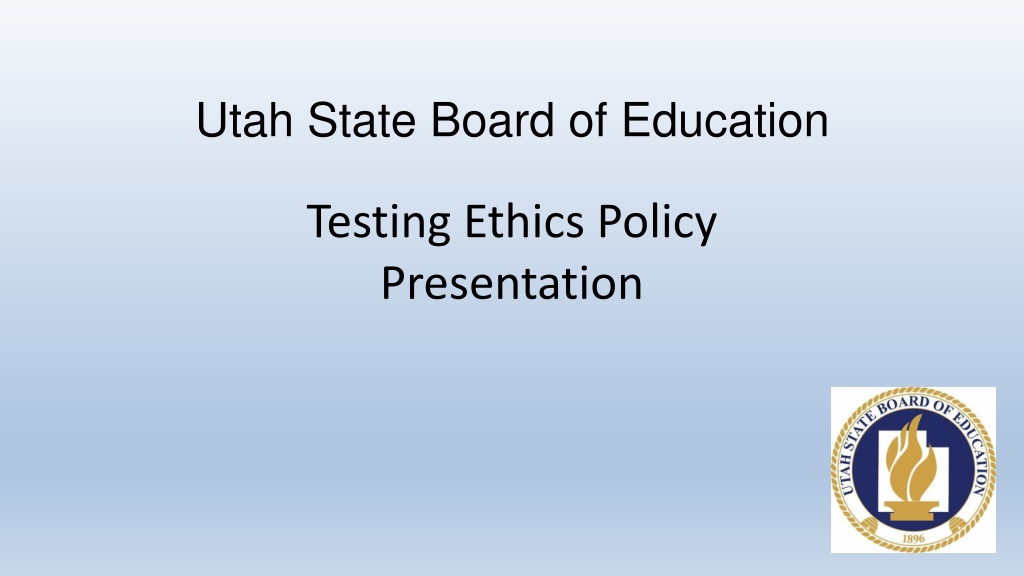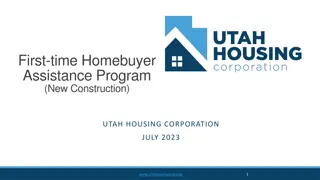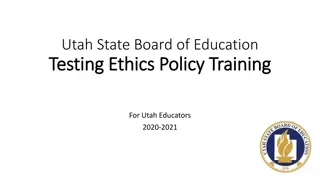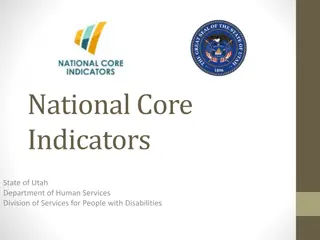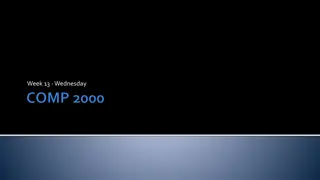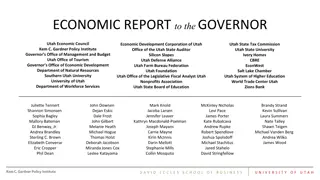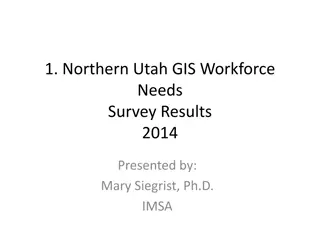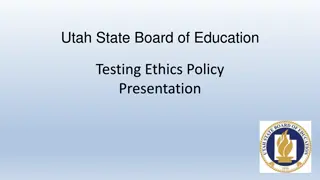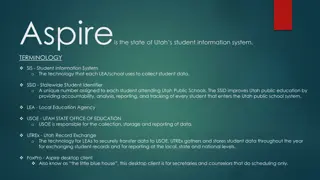Utah State Board of Education Testing Ethics Policy Presentation
This presentation by the Utah State Board of Education outlines the organization of the Standard Test Administration and Testing Ethics Policy. It covers the purpose of testing, assessments, mandated assessments, state assessments, federal assessments, and required district assessments. The focus is on maintaining ethical testing practices and ensuring fair assessment for students.
Download Presentation

Please find below an Image/Link to download the presentation.
The content on the website is provided AS IS for your information and personal use only. It may not be sold, licensed, or shared on other websites without obtaining consent from the author. Download presentation by click this link. If you encounter any issues during the download, it is possible that the publisher has removed the file from their server.
E N D
Presentation Transcript
Utah State Board of Education Testing Ethics Policy Presentation
Organization of the Policy and Presentation The Standard Test Administration and Testing Ethics Policy is organized by the following headings. Click on the headings below to go to that part of the presentation.To return to this slide, click on the USBE seal. Purpose of testing Assessments Before Testing: Teaching Practices During Testing After Testing Unethical Testing Practices Testing Ethics Violations Resources Have a copy of the testing ethics policy as you listen to the video.
Purpose of Testing When administered properly, state assessments allow students to demonstrate what they know and can do." Educators are obligated to provide students with opportunities to demonstrate their knowledge and skills fairly and accurately. Educators involved with state assessments must conduct testing in a fair and ethical manner.
Assessments State assessments require that educators adhere to all ethical practices and procedures as outlined in this policy. With the variety of assessments, how do I know what state assessments are covered with this policy?
Mandated Assessments State assessments are Federally mandated, State mandated, and/or Require the use of a state assessment system or software that is provided or paid for by the state That s great, but give me specifics. What are they? Take a look at the Assessment and Accountability webpages - http://www.schools.Utah.gov/assessment
State Assessments: AAPPL for DLI (not foreign language testing) Acadience Reading (K-3) Acadience Math (K-3) ACT (11th grade administration) Civics Test (required for graduation) DLM (alternate test to RISE and UA+) Kindergarten Entry and Exit Profile (KEEP) RISE (grades 3-8) Utah Aspire Plus (grades 9-10)
Federal Assessments: NAEP (selected schools only) WIDA (grades K-12 students receiving EL services)
What about required district assessments?
District Assessments: Acadience Reading (4-6) ELA Benchmarks Growth Measure (6-12) CogAT Universal Screener (6th grade) ALPS Testing PSI/PASI Diagnostic Assessments (K-6) AAPPL for foreign language classes ELA Benchmarks
BEFORE Testing: Teaching Practices What are the expectations for licensed Utah educators prior to testing? 1. Provide instruction aligned to the Utah Core State Standards using appropriate, locally adopted curriculum. 2. Provide accommodations throughout instruction to eligible students as identified by an EL, IEP or 504 team. 3. Use a variety of assessment processes throughout the year to assess student competency and inform instructional practices.
BEFORE Testing: Teaching Practices What are the expectations for licensed Utah educators prior to testing? 4. Provide students with a variety of assessment experiences, including feedback on their performance. 5. Use the resources provided for each assessment, as applicable, to familiarize students with the testing tools and question types.
During Testing: Utah LEAs shall ensure that: Curriculum and instruction are aligned with Utah Core State Standards. Parents are provided with procedures regarding student participation in state testing: o An LEA shall honor parent requests to excuse a student from taking an assessment.
During Testing: Utah LEAs shall ensure that: All tests are proctored by a licensed educator. Educators and support staff who participate in test administration shall complete an annual testing ethics training. Educators review preparation guidelines and test administration manuals (TAM) for the assessment prior to test administration.
During Testing Licensed Utah educators shall insure that: An appropriate environment is set for testing to limit distractions. All students who are eligible to test are tested or recorded as to why they didn't participate. A student is not discouraged from participating in testing. Students have not been penalized for opting out of state assessments. Students aren't rewarded for participating in or performing well on state assessments.
During Testing Licensed Utah educators shall insure that: Students are provided an alternative learning activity if they are opted out of a state assessment. A proctor is present and active proctoring takes place throughout the entire test session. Students do not use personal electronic devices during testing. Make-up and test completion sessions are provided for students. Accommodations are provided to eligible students.
AFTER testing - LEAs LEAs SHALL ensure that test results are: Provided to students and parents within 3 weeks of the LEA receiving them WITH information on how to appropriately interpret scores and reports. Made available to educators for improving their instruction. Maintained according to LEA policies and procedures.
AFTER testing - Educators Licensed educators SHALL ensure that: All by-products (e.g. scratch paper, notes, student test tickets) of student testing are collected, secured, and destroyed as appropriate All test materials are returned to the test coordinator, as appropriate
AFTER testing - Educators MAY: Use a student's score from a state assessment to improve the student's academic grade for or demonstrate the student's competency within a relevant course (53E-4-3 (302-305)). o REMEMBER: Using a student's score from a state assessment can only IMPROVE a student's grade - not hurt it. o If a student is proficient or higher on a state assessment, they receive 100% of the points possible. If a student is not proficient on a state assessment, the grade cannot be impacted.
Other things to note about using a student's score as part of a grade: REMEMBER: Students cannot be rewarded for taking a state assessment. For example: o Educators cannot assign participation points on students' grades for taking a state assessment. o Treats or prizes cannot be given out for participation in or doing well on a state assessment.
AFTER testing may NOTs for Educators and LEAs Educators May NOT Use a student s score on a state required assessment as the sole source to determine whether the student may advance to the next grade level. Use a student's score on a state required assessment to determine an overall grade for the course. Prohibit a student from enrolling in an honors, advanced placement, or International Baccalaureate course based on a student s score on a state required assessment or because the student was exempted from taking the state required assessment R277-404-6. School Responsibilities
Unethical Testing Practices Remember, we want to know what the STUDENT knows and can do. If your actions will cause students to NOT receive a valid and reliable score, that accurately reflects what they know and can do, don t do it!
Unethical Testing Practices Review the Unethical Testing Practices on pages 3 and 4 of the Standard Test Administration and Testing Ethics Policy.
Examples of Unethical Testing Practices Providing instruction from test questions or items Changing student responses in a test Rewording or clarifying test questions Allowing students to use unauthorized resources to help them on the test Displaying materials on classroom walls that are part of a test Suggesting to a students that they should re-think their responses Encouraging parents to opt their child out of a test
Testing Ethics Violations To whom do I report a testing ethics violation?
Testing Ethics Violations Protocol Protocol: An initial investigation should be conducted at the school level The LEA assessment director will review the initial investigation and determine findings. Be sure to know who your assessment director is. If the violation is of sufficient concern, the incident may also be forwarded to the Utah Professional Practices Advisory Commission (UPPAC) for review If inappropriate practices are substantiated, educators or other staff may receive further training or a reprimand, be subject to disciplinary action, and/or lose their Utah teaching license be terminated, Jordan School District's Assessment Director: Ben Jameson 801-567-8243 - ben.jameson@jordandistrict.org
